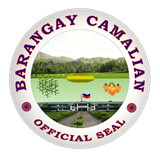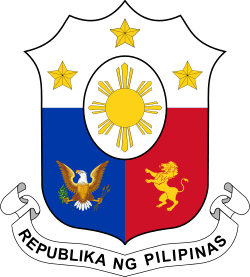Camali-an
Camali-an is one of the 44 barangays of the municipality of Ubay, in the province of Bohol, Philippines.
Camali‑an | |
|---|---|
 Seal | |
| Coordinates: 10°00′57″N 124°24′54″E | |
| Country | Philippines |
| Region | Central Visayas Region VII |
| Province | Bohol |
| District | 2nd District of Bohol |
| Municipality | Ubay |
| Urban District | III |
| Purok | 6 |
| Government | |
| • Type | Sangguniang Barangay |
| • Barangay Captain | Armando Dusaban |
| • Brgy Council | |
| Area | |
| • Total | 532 ha (1,315 acres) |
| Population (2015 census)[1] | |
| • Total | 642 |
| • Density | 120/km2 (310/sq mi) |
| • Voter (2013)[2] | 437 |
| Time zone | UTC+8 (PST) |
| ZIP code | 6315 |
| IDD : area code | +63 (0)38 |
| PSGC | 071246012 |
The barangay's total land area is 532 hectares (1,310 acres).[3] According to the 2015 census, it has a population of 642.[1]
Camali-an celebrates its annual fiesta on 26 November in honor of their patron saint.
Location
Located on the western portion of the municipality, Camalian is bounded to the north by Tubog, to the east by Pag‑asa, to the south by Hambabauran, and to the west by the municipality of San Miguel. Camalian is 12 km (7.5 mi) from the town center, Poblacion.
Government
There are six puroks overseen by the elected kagawads.
Economy
People in the barangay are mostly farmers who live by planting rice, corn, bananas, peanuts, mongo, sweet potato, cassava, and ube. Some till small agricultural lots. Some of population also weave mats and amakan, and produce palm oil and coconut products.
Facilities and services
- Barangay Chapel
- Barangay Hall
- Barangay Health Center
- Day Care Center
- Elementary School
- Multi-Purpose Hall
- 6 Purok Kiosks
References
- Census of Population (2015). "Region VII (Central Visayas)". Total Population by Province, City, Municipality and Barangay. PSA. Retrieved 20 June 2016.
- Project of Precincts for the 2013 Barangay Elections
- Saz, Efren B. (April 2007). "A Comprehensive Assessment of the Agricultural Extension System in the Philippines: Case Study of LGU Extension in Ubay, Bohol" (PDF). Philippine Institute for Development Studies. Retrieved March 14, 2015.

